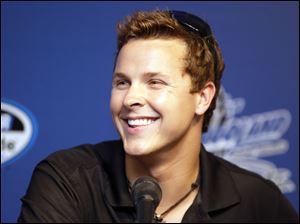
NASCAR's Bayne says he has multiple sclerosis
Says diagnosis won't slow racing career
11/12/2013
Trevor Bayne, the 2011 Daytona 500 winner, smiles as he listens to questions during a news conference in June, 2011.
CHARLOTTE, N.C. — Determined to learn exactly what caused his mystery illness 2011, Trevor Bayne made repeated visits to the Mayo Clinic over the last two years, asking questions about his health and medical history.
The youngest winner in Daytona 500 history wasn’t sick and he wasn’t suffering from any of the symptoms — nausea, fatigue, double vision and numbness in his arm — that had sidelined Bayne for five races in 2011.
He just wanted an answer.
Bayne finally got it in June when doctors confirmed that the 22-year-old Bayne has multiple sclerosis, a diagnosis he revealed publicly today.
“I think MS takes time to diagnose and, as a doctor, you don’t want to jump right in and give a diagnosis to somebody,” Bayne said. “I think a smart doctor is going to continue to do things. Obviously, it’s a different kind of condition than something where you can just see it immediately, so over time they just evaluate you and the doctors just run a bunch of different tests.”
Bayne, who was 20 when he won the Daytona 500 two seasons ago, will compete as scheduled at Homestead-Miami Speedway this weekend in the Nationwide and Sprint Cup Series finales. He will also run a full Nationwide schedule next season for Roush Fenway Racing and a partial Cup schedule for The Wood Brothers.
Bayne’s younger sister, Sarah, also has MS, but he said the disease wasn’t something doctors were particularly looking for when he was hospitalized in 2011.
“MS is not a hereditary or family kind of condition, so it’s something that is an individual basis,” he said. “They don’t connect them at all because it’s not a family kind of thing.”
Bayne first felt numbness in his arm during a race at Texas in 2011, six weeks after his Daytona 500 victory. At the time, he assumed it was related to an insect bite on his elbow that had become irritated and developed a rash.
He was admitted to the Mayo Clinic three weeks later for nausea, fatigue and double vision. Bayne underwent a spinal tap, doctors ruled out Lyme disease, and ultimately discharged him with a diagnosis of an “inflammatory condition.” It was never made clear if it was related to the insect bite, and Bayne said in later interviews he believed he was suffering from Lyme disease.
Now he’s not sure, and says the 2011 illness “is what led to my eventual diagnosis this year.”
“Obviously, I’ve been going to the Mayo Clinic regularly for checkups and evaluations, and they started checking on me and researching,” he said. “We didn’t have a diagnosis then, so this is what has led to the diagnosis.”
MS is a potentially disabling disease in which the immune system attacks the central nervous system, which includes the brain, spinal cord and optic nerves. Symptoms can be mild, such as fatigue, or severe, including paralysis or loss of vision. There is no cure, but treatment can help manage symptoms and reduce the progress of the disease.
MS is not technically hereditary, but having a relative such as a parent or sibling with MS can increase an individual’s risk of developing the disease over the general population. Studies have shown there is a higher prevalence of certain genes in populations with higher rates of MS, according to the National Multiple Sclerosis Society.
Roush Fenway Racing President Steve Newmark said Bayne was dogged in his push for a definitive diagnosis.
“I think that it was refreshing that he actually got a diagnosis because there had been some uncertainty about what had unfolded previously, so I know it was comforting to him and that’s why he pursued it so strongly,” Newmark said. “The reality of it is if Trevor wasn’t a race car driver and didn’t have the means, he probably would never have been diagnosed at this point. It was through his determination of just regularly getting checked that it came to light.”
Bayne, who competed in his first triathlon last December, said he’s not taking any medication and suffers no symptoms. He was diagnosed during a whirlwind three weeks in June in which he was married, making frequent trips to the Mayo Clinic in Minnesota and won his only Nationwide race of the year at Iowa.
He said he needed time to accept and process the diagnosis, and chose now to go public with his disease because he’s doesn’t want to hide from it. Bayne is a devout Christian, and often gives motivational speeches.
“I think anybody that gets a diagnosis is going to sit back and think about it, ‘What does this mean? What does it mean to my family? What does it mean to me and my partners? Our team?’ The more and more I thought about it, and the more and more I realized that I was fine, the more and more it sunk in that everything is going to be OK,” Bayne said.
’’Why not help other people through their struggles and point them in the right direction? For me, I feel like that’s what I’m called to do, so why be silent about it and why just sit back on our heels and not do anything? I’m a race car driver, that’s what I do, but it’s not all of who I am.”